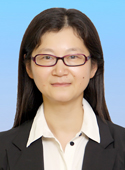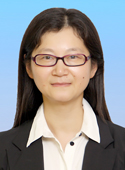RESUME
Xiangyan KONG received the B.S. degree in Qufu Normal University in 1995. From Jul. 1995 to Aug. 1999, she worked as assistant professor in department of physics, China University of Petroleum (UPC). In May 2002, she received M.S. degree in University of Science and Technology Beijing (USTB) (major on AMR device design and fabrication). In August 2005, she received Ph.D. degree in Institute of Physics, Chinese Academy of Sciences (working on high Tc SQUID fabrication and application in MCG and NDE). From Sep. 2005 to Mar. 2010, she furthered her Postdoctoral research at Osaka University belonging to Japan Science & Technology Agency (JST) and Global COE program, respectively (working on high-Tc SQUID design and fabrication, SQUID scanning microscope and its application). From April 2010, she has been an associate professor in Shanghai Institute of Microsystem and Information Technology (SIMIT), Chinese Academy of Sciences (CAS). From March 2011, she is selected as CAS Hundred Talents professor and a supervisor for doctoral students. Her research interests are superconductive electronics including micro/nano superconducting devices and their low frequency applications. Her current research is related to superconducting quantum interference device (SQUID) and its applications in Biomag, NonDestructive Evaluation She has published about 30 first/corresponding-author papers in peer-reviewed academic journals and owns more than 20 patents. Now she is the advanced member of Chinese Institute of Electronics, member of National Technical Committee for standardization of superconductivity (SAC/TC265) and IEICE oversea member.
EDUCATION
l 1991.09~1995.07, B. Sc, Department of Physics, Qufu Normal University (QFNU), China
l 1999.09~2002.05, M. Sc., Department of Physics, University of Science and Technology Beijing (USTB), China
l 2002.07~2005.08, Ph. D., Institute of Physics, Chinese Academy of Sciences (IOP, CAS)
WORK EXPERIENCE
l 1995.07~1999.08, Assistant professor, Department of Physics, China University of Petroleum
l 2005.09~2007.10, Postdoctor Researcher, Japan Science and Technology Agency (JST)
l 2007.11~2010.03, Postdoctor of Global COE, School of Engineering Science, Osaka University
l 2010.04~2011.03, Associate Researcher, Shanghai Institute of Microsystem & Information Technology (SIMIT), Chinese Academy of Sciences (CAS)
mAJOR HONORS
2011, Hundred talents program, from Chinese Academy of Sciences
2015, Shanghai Youth Science Research Institute part-time tutor
2015, Bureau member of China Heart Congress (CHC)
2016, Special award of Shanghai Industry-Academy-Research cooperation excellent project award
mAJOR HONORS
2011, Hundred talents program, from Chinese Academy of Sciences
2015, Shanghai Youth Science Research Institute part-time tutor
2015, Bureau member of China Heart Congress (CHC)
2016, Special award of Shanghai Industry-Academy-Research cooperation excellent project award
X Y Kong*, Ye Tian, H W Wang, S P Zhao, G H Chen and Q S Yang. The ordering of spontaneous magnetization moments in large-scale two-dimensional superconducting p-ring arrays, Superconductor Science and Technology 17(6):791. (2004).
[2] X Y Kong*, Y F Ren, J W Li, H W Yu, G H Chen and Q S Yang. A novel quadruple excitation in high-Tc SQUID-based non-destructive evaluation, Superconductor Science and Technology 19(2):223-226. (2006).
[3] X Y Kong*, K Sakuta, H Itozaki. A Magnetic shielding around the Flux Guide in SQUID Probe Microscope with Finite Element Simulation, Superconductor Science and Technology 20(12): 1140. (2007).
[4] Xiangyan Kong*, Shulin Zhang, Yongliang Wang, Jia Zeng, and Xiaoming Xie. Multi-channel Magnetocardiography System Based on Low-Tc SQUIDs in an Unshielded Environmen, Physics Procedia 36: 286. (2012).
[5] Xiangyan Kong*, Yi Zhang, Xiaoming Xie and Mianheng Jiang, Novel Superconducting Quantum Interference Device Bootstrap Circuit and Its Applications in Biomagnetism, IEICE Transactions on Electronics. E96-C(3):320.(2013).
[6] Jia Zeng, Yi Zhang, Michael Mück, Hans-Joachim Krause, Alex I. Braginski, Xiangyan Kong, Xiaoming Xie, Andreas Offenhausser, and Mianheng Jiang. High intrinsic noise and absence of hysteresis in superconducting quantum interference devices with large Steward-McCumber parameter, Applied Physics Letters 103(4): 042601. (2013).
[7] Zhang Shu-Lin*, Zhang Guo-Feng, Wang Yong-Liang, Liu Ming, Li Hua, Qiu Yang, Zeng Jia, Kong Xiang-Yan*, and Xie Xiao-Ming, Multichannel fetal magnetocardiography using SQUID bootstrap circuit, Chin. Phys. B Vol. 22, No. 12 (2013) 128501.
[8] ZHANG ShuLin*, ZHANG GuoFeng, WANG YongLiang, ZENG Jia1, QIU Yang, LIU Ming, KONG XiangYan* & XIE XiaoMing, A novel superconducting quantum interference device for biomagnetic measurements, Chin Sci Bull Vol.58 No.24 (2013), 2917-2919.
[9] Chao Liu, Yi Zhang, Michael Mück, Shulin Zhang, Hans-Joachim Krause, Alex I Braginski, Guofeng Zhang, YongliangWang, Xiangyan Kong, Xiaoming Xie, Andreas Offenhäusser and Mianheng Jiang. Statistical characterization of voltage-biased SQUIDs with weakly damped junctions, Superconductor Science and Technology 26(6): 065002. (2013).
[10] Qiu Yang, Liu Chao, Zhang Shu-Lin, Zhang Guo-Feng, Wang Yong-Liang, Li Hua, Zeng Jia, Kong Xiang-Yan*, and Xie Xiao-Ming, A SQUID gradiometer module with large junction shunt resistors, Chin. Phys. B Vol. 23, No. 8 (2014) 088503.
[11] Liliang Ying, Xinjie Kang, Lu Zhang, Guofeng Zhang, Huiwu Wang, Wei Peng, Xiangyan Kong, Xiaoming Xie, Zhen Wang. Investigation of profile characteristics and interface of anodized niobium superconducting films, Physica C 499:50. (2014).
[12] Jia Zeng, Yi Zhang, Matthias Schmelz, Michael Mück, Hans-Joachim Krause, Alex I. Braginski, Yong-Ho Lee, Ronny Stolz, Xiangyan Kong, Xiaoming Xie, Hans-Georg Meyer, Andreas Offenhäusser and Mianheng Jiang. Analysis of dc SQUID readout scheme with voltage feedback circuit and low-noise preamplifier, Superconductor Science and Technology 27(8):085011. (2014).
[13] Yang Qiu, Hua Li, Shulin Zhang, Yongliang Wang, Xiangyan Kong*, Guofeng Zhang, Chaoxiang Zhang, Yongsheng Zhang, Xiaofeng Xu, Kang Yang, Xiaoming Xie, Low-Tc DC SQUID magnetometer-based 36-channel magnetocardiography system in a magnetically shielded room, Chin. Phys. B Vol. 24, No. 7(2015) 078501.
[14] Li Hua, Zhang Shu-Lin, Qiu Yang, Zhang Yong-Sheng, Zhang Chao-Xiang, Kong Xiang-Yan*, and Xie Xiao-Ming, Baseline optimization of SQUID gradiometer for magnetocardiography, Chinese Physics B 24(2):028501. (2015).
[15] Hai Wang, Yongliang Wang, Xiangyan Kong*, Guofeng Zhang, Zhang Yi, and Xiaoming Xie, Dependence of SQUID intrinsic flux noise on Stewart-McCumber parameter bc of Josephson junction, IEEE Transactions on Applied Superconductivity. 26(5), pp601705(2016).
[16] Kang Yang, Hua Chen, Xiangyan Kong*, Li Lu, Ming Li, Ruihu Yang, and Xiaoming Xie, Weakly Damped SQUID Gradiometer with Low Crosstalk for Magnetocardiography Measurement, IEEE Transactions on Applied Superconductivity. 26(8), pp1602205(2016).
[17] Hai Wang, Hua Chen, Xiangyan Kong*, Meiling Wang, Yi Zhang*, and Xiaoming Xie, Study on Noise Matching Between SQUID Sensor and Its Readout Electronics, IEEE Transactions on Applied Superconductivity. 27(4), pp 1601104(2017).

